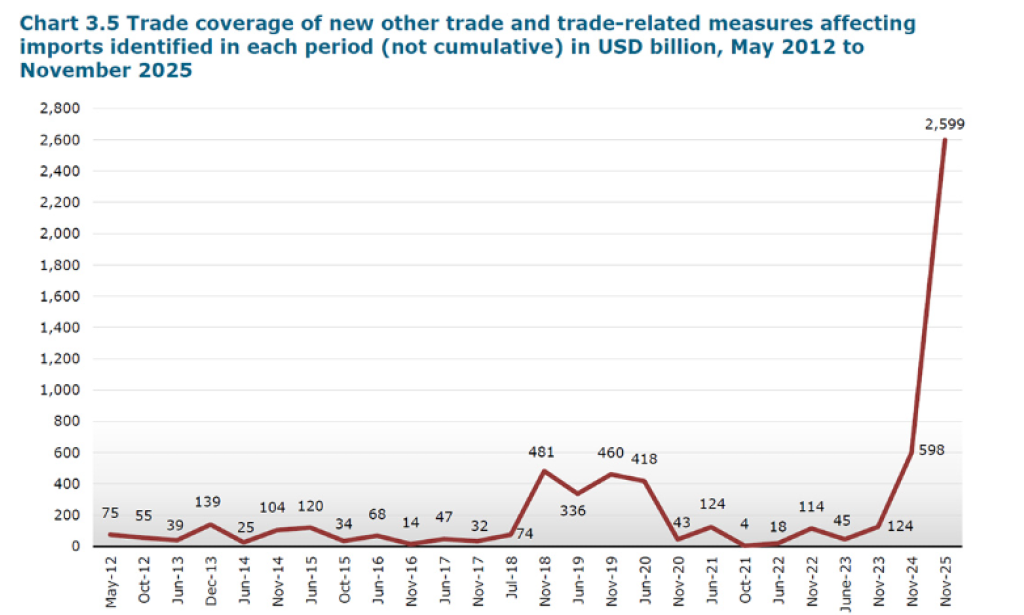 Surge in new tariffs accompanied by measures to increase trade, WTO report on G20 finds
Surge in new tariffs accompanied by measures to increase trade, WTO report on G20 finds
More
- 32nd Joint Summary on G20 Trade and Investment Measures (OECD/WTO/UNCTAD)
- 32nd WTO Report on G20 Trade Measures (mid-October 2024 to mid-October 2025)
- Summary and Status of G20 trade and trade-related measures since October 2008
- 32nd OECD/UNCTAD Report on G20 Investment Measures
G20 merchandise imports worth USD 2,599 billion, or 14.3 per cent of their total, were affected mostly by tariffs along with other measures introduced between mid-October 2024 and mid-October 2025 - more than four times the USD 599 billion recorded in the preceding period. Adding similar measures on exports, a total of 185 measures affect trade worth about USD 2,900 billion (compared to USD 829 billion recorded in the previous G20 report).
Over the same period, G20 economies also introduced a large number of new trade-facilitating measures, and mostly refrained from retaliation, favouring dialogue and reducing trade barriers instead.
G20 economies introduced 184 trade-facilitating measures on goods, covering trade estimated at USD 2,055 billion (nearly double the USD 1,070 billion recorded in the last report).
Commenting on the findings, WTO Director-General Ngozi Okonjo-Iweala said: "Even as the global trading system endures the most severe disruptions in 80 years, trade is showing considerable resilience as most WTO members continue to trade normally with each other. This latest monitoring report gives us new figures to illustrate the realities on the ground. We see protectionist measures affecting a substantially higher share of world trade. At the same time, we see a lot of trade-facilitating measures, reflecting a desire by members to reduce trade costs even as barriers rise elsewhere. It's welcome that we see ongoing dialogue instead of escalating retaliation. WTO members should seize this moment to put trade on firmer footing by reforming and repositioning the WTO."
The stockpile of measures affecting imports had been steadily accumulating since the 2008-09 global financial crisis, but its size has now sharply increased: a year ago 12.9 per cent of G20 imports were affected (USD 2,353 billion or 9.9 per cent of world imports); that share has now jumped to 22.0 per cent (USD 4,015 billion or 16.9 per cent of world imports).
WTO economists estimate world merchandise trade growth at 2.4% in 2025 and at 0.5% in 2026, with stronger-than-expected trade growth in the first half of 2025 driven by import frontloading, strong demand for AI-related products, and continuing trade growth among most WTO members, notably developing economies. The new G20 report notes increased dialogue among trading partners and efforts to negotiate trade solutions.
During the review period, G20 economies initiated 28.5 trade remedy investigations per month on average -- less than the monthly average of 32.5 recorded in 2024 but close to the 2020 level of 28.6 per month. The average number of trade remedy terminations was 9.3 per month, marking the third-lowest level since 2016. Trade remedy actions-particularly anti-dumping measures-remain a key trade policy instrument for most G20 economies, accounting for 55.2 per cent of all trade measures on goods recorded in this report.
With respect to services, G20 economies introduced 52 new measures between mid-October 2024 and mid-October 2025, with more than two-thirds aimed at facilitating trade. Approximately 43 per cent were applied across most sectors, primarily affecting services supplied through commercial presence (also known as "mode 3") and through the movement of professionals (known as "mode 4"). Additionally, around 10 per cent of the new measures targeted Internet and other network-enabled services, as well as telecommunications services.
During the review period, G20 economies introduced an increased number of general and economic support measures, many of which were linked to key sectors such as the environment, energy, and agriculture. The report notes a possible shift toward non-financial interventions and the pursuit of broader strategic policy objectives.
WTO members continued to raise trade concerns in WTO committees and bodies throughout the review period, most of which related to measures or policies implemented by G20 economies. WTO committees remained important platforms for addressing trade-related issues, enabling members to engage on actual or potential areas of friction, the report found.
The G20 Trade Monitoring Reports have been prepared since 2009, in response to the request by G20 Leaders to the WTO, together with the Organisation for Economic Co-operation and Development (OECD) and the United Nations Conference on Trade and Development (UNCTAD), to monitor and report on trade and investment measures implemented by G20 economies.



You must be logged in to post a comment.